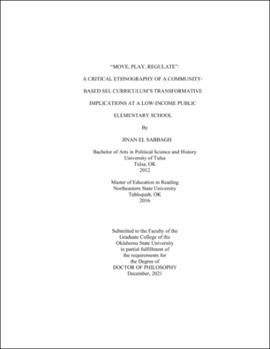| dc.contributor.advisor | Dyke, Erin | |
| dc.contributor.author | El Sabbagh, Jinan | |
| dc.date.accessioned | 2022-05-13T15:26:36Z | |
| dc.date.available | 2022-05-13T15:26:36Z | |
| dc.date.issued | 2021-12 | |
| dc.identifier.uri | https://hdl.handle.net/11244/335749 | |
| dc.description.abstract | As trauma-informed and socioemotional learning (SEL) continues to gain traction in public schools (Cipriano, 2019), studies emerge to attend to the growing critiques related to the absence of systemic racism and other oppressive structures as part of this curriculum (Camangian & Cariaga, 2021; Simmons, 2019). The context of this study includes the dual crisis of a pandemic and the intensification of economic, health, and educational turmoil as well as continued state-sanctioned murder of Black and Brown bodies (Dunn et al., 2021). This critical ethnography conducted in the 2020-2021 school year, explores, and analyzes the possibilities and challenges of an equity centered, transformative SEL program as it is implemented in an urban Oklahoma public elementary school. With the inclusion of Abolition Teaching Network (ATN)'s SEL tenets to this curriculum (2020) and ongoing conversations on abolition and culturally responsive-sustaining educational practices, this study offers educators, principals, and those in and outside the classroom competing and simultaneously employed frameworks for implementing transformative SEL. These frameworks inform not only further research on the possibilities and limitations to SEL in the school setting, but it also introduces key lessons for future consideration. After an eight-month study which included virtual and in-person classroom observations, interviews, survey data, and artifacts, two major themes were identified. The first was competing frameworks of 'safety' at the schoolwide level. The second was expanding on the theme of safety by interrogating 'belonging' and community building efforts both virtually and when students returned to in-person learning. Ultimately, this study adds a practical and theoretical component to conversations and efforts around SEL, trauma-informed pedagogies and the school-to-prison nexus. | |
| dc.format | application/pdf | |
| dc.language | en_US | |
| dc.rights | Copyright is held by the author who has granted the Oklahoma State University Library the non-exclusive right to share this material in its institutional repository. Contact Digital Library Services at lib-dls@okstate.edu or 405-744-9161 for the permission policy on the use, reproduction or distribution of this material. | |
| dc.title | "Move, play, regulate": A critical ethnography of a community-based SEL curriculum's transformative implications at a low-income public elementary school | |
| dc.contributor.committeeMember | Wang, Hongyu | |
| dc.contributor.committeeMember | Schwarz, Corinne | |
| dc.contributor.committeeMember | Shaw, Donita | |
| osu.filename | ElSabbagh_okstate_0664D_17401.pdf | |
| osu.accesstype | Open Access | |
| dc.type.genre | Dissertation | |
| dc.type.material | Text | |
| dc.subject.keywords | (transformative) social-emotional learning | |
| dc.subject.keywords | critical ethnography | |
| dc.subject.keywords | culturally responsive sustaining pedagogies | |
| dc.subject.keywords | public elementary school | |
| dc.subject.keywords | school to prison nexus | |
| thesis.degree.discipline | Curriculum Studies | |
| thesis.degree.grantor | Oklahoma State University | |
